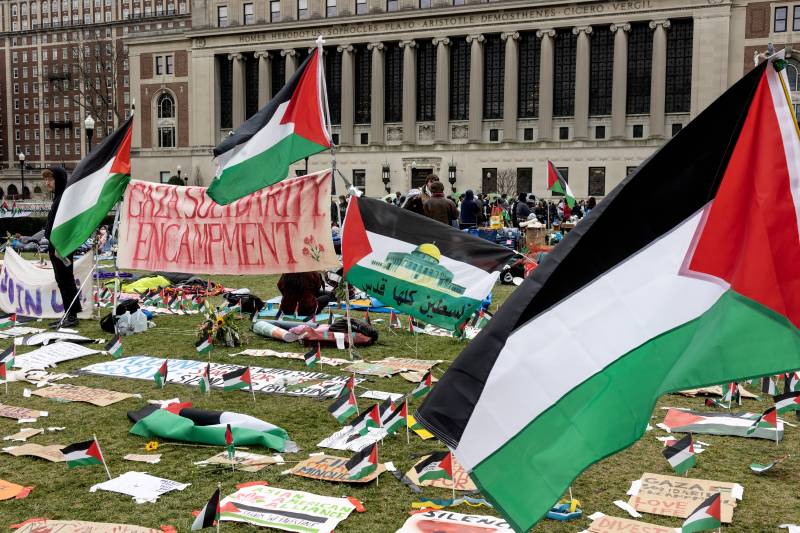
The Gaza Solidarity Encampment at the Columbia University in New York has entered its seventh day, as university campuses across America have erupted into protests over Israel’s war in Gaza. Student protestors are demanding that their institutions divest from weapons manufacturers and cut financial ties to Israel over the war in Gaza.
Columbia University has issued a fresh 48-hour deadline to student protestors to clear out the encampment, as protests that erupted on Columbia’s campus continue to spread across the country. Solidarity encampments have now been established at Brown University, the University of Michigan, UC Berkeley, the Massachusetts Institute of Technology and the University of Minnesota.
Columbia moved all of its classes online on Monday, and in her email to the campus community, President Minouche Shafik wrote that “Anti-Semitic language, like any other language that is used to hurt and frighten people, is unacceptable and appropriate action will be taken.”
Only a few miles away from Columbia’s Gaza Solidarity Encampment, in Midtown Manhattan, multiple student protestors were arrested on NYU’s campus on Monday, April 23. NYU’s student newspaper Washington Square News reported that police had arrested 120 protestors, which included students and faculty, at the Gaza Solidarity Encampment in Gould Plaza.
In New Haven, police on Yale’s campus arrested 47 pro-Palestinian student protestors the same day, where an encampment was set up at Beinecke Plaza.
Over a hundred pro-Palestinian student protestors were arrested on April 18 on Columbia’s campus, only a day after the University’s President Minouche Shafik testified before Congress. The arrests took place over allegations of anti-Semitism.
Among the arrested students was Isra Hirsi, daughter of Congresswoman Rep. Ilhan Omar (D-MN), a junior at Barnard College. In an interview to Teen Vogue, Hirsi has confirmed being suspended by Columbia University’s administration for “posing an ongoing threat of disruption of, or interference with, the normal operation of the College.”
Rep. Ilhan Omar was also the first member of Congress to visit an encampment at the University of Minnesota on Tuesday, claiming that she was “incredibly moved by the courage and bravery as the student body, in putting your bodies on the line to stand in solidarity to end the genocide that is taking place in Gaza at this moment.” Rep. Omar also spoke of the mass graves discovered in Khan Younis, criticizing the media for portraying the student protestors as the main story.
Days before tensions on campus reached a fever fitch, Columbia University’s President Minouche Shafik faced intense scrutiny over the reported increase in anti-Semitic incidents on campus after Israel began its offensive in Gaza at a highly charged Congressional hearing. Shafik appeared overwhelmed as she was grilled by Congress members over her institution's perceived failure to address what was described as "a breeding ground of anti-Semitism and animosity."
The hearing, titled "Columbia in Crisis: Columbia University's Response to Anti-Semitism," came on the heels of escalating tensions between pro-Israel and pro-Palestinian groups at Columbia. Central to the debate are disagreements over the definition of antisemitism and the contentious issue of whether it should include opposition to Zionism and the State of Israel.
At the Gaza Solidarity Encampment, multiple Columbia University professors spoke in support of the students claiming that the protests were a violation of the principle of freedom of expression. Helen Benedict, a professor of journalism, termed the arrests as an “overreaction.” Multiple professors walked out in support of the students. Marianne Hirsch, a professor of literature who specializes in Holocaust studies, claimed that the university’s actions were “cutting down on the academic freedom to be critical.”
In a statement, the organizers of the encampment at Columbia, the Columbia University Apartheid Divest (CUAD) coalition said that they would not engage with the university administration until “there is a written commitment that the administration will not be unleashing the NYPD or the National Guard on its students.” Columbia’s administration has also come under fire for choosing to suspend Students for Justice in Palestine and Jewish Voice for Peace in November 2023.
The student groups claim that they will continue their encampment until their demands are met.
